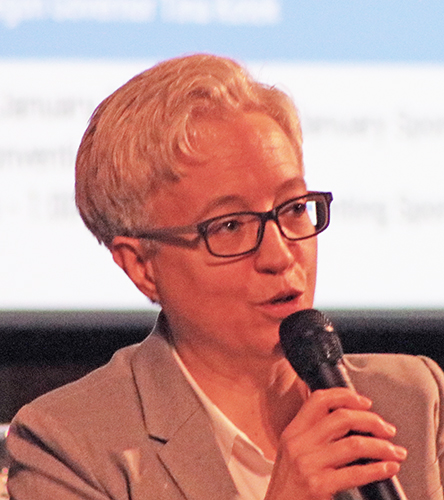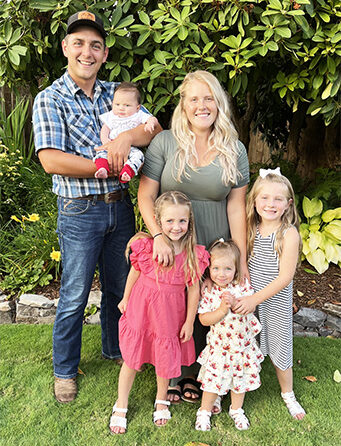Oregon Governor Tina Kotek, who is starting her second year in office, was the featured speaker at a Salem Chamber of Commerce event on Jan. 8 at the Salem Convention Center.
The event, which attracted a capacity crowd of 300 people, was part of the Chamber’s speakers series and was not intended to be viewed as a state of the state address, a Kotek aide said.
Kotek spoke for about 15 minutes, engaged in a 35-minute Q & A with Chamber President Alan Rasmussen of Aumsville, and then fielded questions that audience members had submitted for the final 10 minutes.
The audience was respectful and applauded the governor politely, but there was little sense that Kotek’s appearance had galvanized many toward her policy goals and initiatives.
Her comments tended toward the aspirational and emphasized “work we still have to do” rather than concrete policies and plans.
Kotek often referred to what she had learned about the state in her Oregon Listening Tour, an ambitious project that put her in all 36 counties.
The tour stopped in Aumsville, Silverton and Detroit on June 22, 2023, with the governor discussing housing and homelessness, agricultural issues and wildfire recovery in the Santiam Canyon.
Kotek, 57, a first-term Democrat from Portland who now lives at the governor’s mansion in Salem, briefly addressed two issues that resonate more broadly in rural Oregon: plans to produce a habitat conservation plan (HCP) for state forests in Western Oregon and the challenge of providing broadband coverage to as many Oregonians as possible.
Rasmussen framed the timber question to align with Kotek’s top issue of housing, with the chamber president, who works for a modular building and storage unit company, asking if the plan might free up more timber and thus lower the materials costs for builders.
Kotek said she supports the HCP process and added that she “needs clarity on what we can protect and what we can harvest. I’m committed to that conversation.”
Kotek said that statewide broadband and better online service are economic necessities.
Other major topics discussed by Kotek included livability issues in Portland, budget challenges and work on homelessness in Salem and the upcoming legislative effort to revise Measure 110.
On Portland: Kotek said that Portland came up often during her listening tour. “Portland needs to be successful,” she said. “If Portland is having problems that’s bad news for the entire state.”
Kotek noted that Portland is a “magnet for fentanyl trafficking” and said that “if your first stop in the state is Portland it should look better and feel safer.”
On Salem: Kotek congratulated Salem city and business leaders as well as its social service teams for turning the corner on homelessness. The governor noted programs providing motel rooms, a navigation center and tiny villages that have “lowered the number of tents on the sidewalks that we used to see five or six years ago.”
She publicly opposed the payroll tax that Salem voters overwhelmingly defeated in the November election. The city was hoping to raise more revenue to fill budget gaps that are partially created by the fact that the dozens of state government buildings in Salem are exempt from property taxes, while the city is stuck with the bill for the public safety work and street infrastructure upkeep.
“States should have a role,” Kotek said, adding, “there are benefits to having state workers here. There is a sweet spot somewhere.”
On Measure 110: Rasmussen described the issue as the “elephant in the room.”
Voters passed the initiative in November 2021 by an almost 59% margin, including a 74% yes vote in Multnomah County, although 19 of the state’s 36 counties voted no.
The measure reduced criminal and possession penalties on drugs such as heroin, meth and oxycodone. The goal of the measure was to provide treatment for users rather than jail time, but the addiction treatment piece of the puzzle has been slow to get started.
“When 110 came in when decriminalized,” Kotek said, “but we didn’t have the other piece ready. You want to get it right. You don’t want to go back and forth.”
Measure 110 reform is high on Kotek’s list of items she hopes the 35-day session of the Legislature will address when it convenes Feb. 5.


